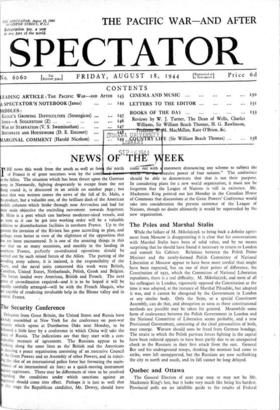The Poles and Marshal Stalin
While the failure of M. Mikolajczyk to bring back a definite agree- ment from Moscow is disappointing it is clear that his conversations with Marshal Stalin have been of solid value, and by no means surprising that he should have found it necessary to return to London and consult his Cabinet. Relations between the Polish Prime Minister and the newly-formed Polish Committee of National Liberation at Moscow appear to have been more cordial than might have been expected, but on one of their points of difference, the Constitution of 1935, which the Committee of National Liberation repudiates, there is a real difficulty. M. Mikolajczyk, and most of all his colleagues in London, vigorously opposed the Constitution at the time it was adopted, at the instance of Marshal Pilsudski, but adopted it was, and it cannot be abrogated by the Government in London or any similar body. Only the Sejm, or a special Constituent Assembly, can do that, and abrogation as soon as these constitutional methods are possible may be taken for granted. Meanwhile some form of coalescence between the Polish Government in London and the National Committee of Liberation seems probable, and a new Provisional Government, consisting of the chief personalities of both, may emerge. Warsaw should soon be freed from German bondage. The straits to which the Polish partisan forces fighting in the capital have been reduced appears to have been partly due to an unexpected check to the Russians in their first attack from the east. General Bor and his underground troops, thinking the moment had come to strike, were left unsupported, but the Russians are now outflanking the city to north and south, and its fall cannot be long delayed.






















